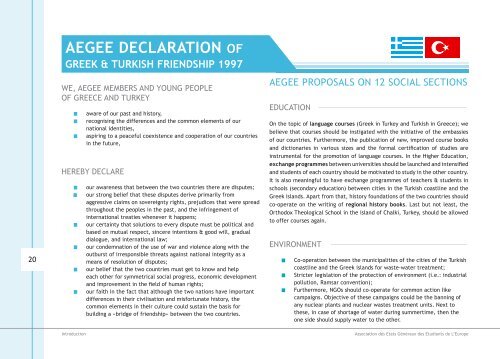turkish-greek civic dialogue - AEGEE Europe
turkish-greek civic dialogue - AEGEE Europe
turkish-greek civic dialogue - AEGEE Europe
Create successful ePaper yourself
Turn your PDF publications into a flip-book with our unique Google optimized e-Paper software.
20<br />
<strong>AEGEE</strong> DECLARATION OF<br />
GREEK & TURKISH FRIENDSHIP 1997<br />
WE, <strong>AEGEE</strong> MEMBERS AND YOUNG PEOPLE<br />
OF GREECE AND TURKEY<br />
aware of our past and history,<br />
recognising the differences and the common elements of our<br />
national identities,<br />
aspiring to a peaceful coexistence and cooperation of our countries<br />
in the future,<br />
HEREBY DECLARE<br />
our awareness that between the two countries there are disputes;<br />
our strong belief that these disputes derive primarily from<br />
aggressive claims on sovereignty rights, prejudices that were spread<br />
throughout the peoples in the past, and the infringement of<br />
international treaties whenever it happens;<br />
our certainty that solutions to every dispute must be political and<br />
based on mutual respect, sincere intentions & good will, gradual<br />
<strong>dialogue</strong>, and international law;<br />
our condemnation of the use of war and violence along with the<br />
outburst of irresponsible threats against national integrity as a<br />
means of resolution of disputes;<br />
our belief that the two countries must get to know and help<br />
each other for symmetrical social progress, economic development<br />
and improvement in the field of human rights;<br />
our faith in the fact that although the two nations have important<br />
differences in their civilisation and misfortunate history, the<br />
common elements in their culture could sustain the basis for<br />
building a «bridge of friendship» between the two countries.<br />
<strong>AEGEE</strong> PROPOSALS ON 12 SOCIAL SECTIONS<br />
EDUCATION<br />
On the topic of language courses (Greek in Turkey and Turkish in Greece); we<br />
believe that courses should be instigated with the initiative of the embassies<br />
of our countries. Furthermore, the publication of new, improved course books<br />
and dictionaries in various sizes and the formal certification of studies are<br />
instrumental for the promotion of language courses. In the Higher Education,<br />
exchange programmes between universities should be launched and intensified<br />
and students of each country should be motivated to study in the other country.<br />
It is also meaningful to have exchange programmes of teachers & students in<br />
schools (secondary education) between cities in the Turkish coastline and the<br />
Greek islands. Apart from that, history foundations of the two countries should<br />
co-operate on the writing of regional history books. Last but not least, the<br />
Orthodox Theological School in the island of Chalki, Turkey, should be allowed<br />
to offer courses again.<br />
ENVIRONMENT<br />
Co-operation between the municipalities of the cities of the Turkish<br />
coastline and the Greek islands for waste-water treatment;<br />
Stricter legislation of the protection of environment (i.e.: industrial<br />
pollution, Ramsar convention);<br />
Furthermore, NGOs should co-operate for common action like<br />
campaigns. Objective of these campaigns could be the banning of<br />
any nuclear plants and nuclear wastes treatment units. Next to<br />
these, in case of shortage of water during summertime, then the<br />
one side should supply water to the other.<br />
Introduction Association des Etats Généraux des Etudiants de L’<strong>Europe</strong>







